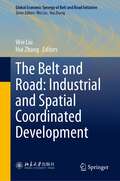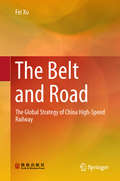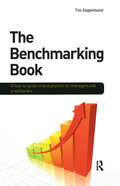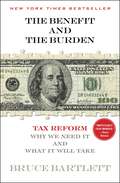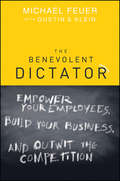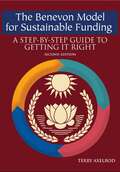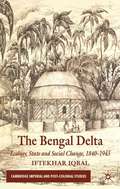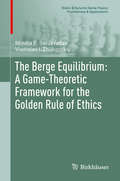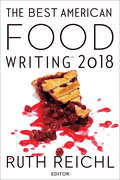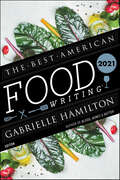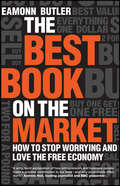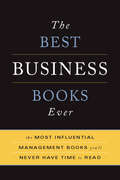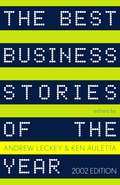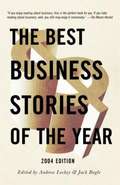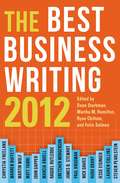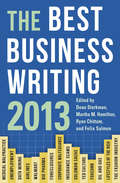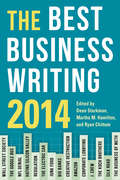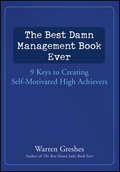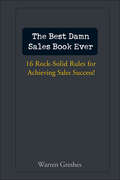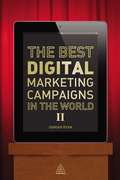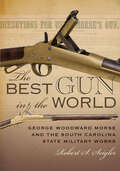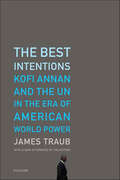- Table View
- List View
The Belt and Road: Industrial and Spatial Coordinated Development (Global Economic Synergy of Belt and Road Initiative)
by Wei Liu Hui ZhangThis book mainly addresses China's Belt and Road Initiative in terms of the connectivity industrial and spatial development, as well as current world's economic and trade pattern under such synergy development, and focuses on the function and mechanism of industry and geography coordination. Although current research on the value circulation between China and developed economies is relatively adequate, the book focuses on the value circulation between the countries and regions, especially the developing economies. China and other developing countries tie strongly with the production value circulation. The coordination industrial and spatial development in the global value cycle is also the cornerstone of long-term stabilization and sustainable development in China. Therefore, this book provides the theoretical and empirical research on Belt and Road from the perspectives on industrial and spatial synergy. This book proposes several questions: Any inherent inlay between industrial and geographic allocation, i.e., is there any possibility for close integration? This book analyzes the necessity of coordinated development of industry and space perspective of production division. Secondly, from the perspective of historical evolution and current situation, it analyzes the relationship among industry, economic growth and fluctuation and compares realizing paths of synergy of industrial and spatial development. It contains the industry and spatial diffusion mechanism and the effect of synergy development. Moreover, the corresponding policy implication is provided for sustainable development through the Belt and Road Initiative.
The Belt and Road: The Global Strategy of China High-Speed Railway
by Fei XuAddressing the unprecedented international interest in China’s high-speed railways, this book adopts a global perspective to examine the success of the system and probes into its going-global strategy in the context of the “Belt and Road” initiative, providing readers around the world a better understanding of infrastructure construction under the “Belt and Road” plan, as well as the global vision of communication and mutual exchange and prosperity among the countries along the Belt and Road route. The previous American President, Barack Obama, once told President Xi Jinping that there were two things about China that he particularly admired: the high-speed railway system, and the mathematics education. "The Belt and Road, and the Global Strategy of China’s High-speed Rail" provides scholarly researchers and those generally interested in China's High-speed rail excellent insight into this impressive and rapid development.
The Benchmarking Book
by Tim StapenhurstWith growing demands for increased operational efficiency and process improvement in organizations of all sizes, more and more companies are turning to benchmarking as a means of setting goals and measuring performance against the products, services and practices of other organizations that are recognized as leaders. The Benchmarking Book is an indispensable guide to process improvement through benchmarking, providing managers, practitioners and consultants with all the information needed to carry out effective benchmarking studies. Covering everything from essential theory to important considerations such as project management and legal issues, The Benchmarking Book is the ideal step-by-step guide to assessing and improving your company’s processes and performance through benchmarking.
The Benefit and The Burden: Tax Reform-Why We Need It and What It Will Take
by Bruce BartlettA thoughtful and surprising argument for American tax reform, arguably the most overdue political debate facing the nation, from one of the most respected political and economic thinkers, advisers, and writers of our time.THE UNITED STATES TAX CODE HAS UNDERGONE NO SERIOUS REFORM SINCE 1986. Since then, loopholes, exemptions, credits, and deductions have distorted its clarity, increased its inequity, and frustrated our ability to govern ourselves. By tracing the history of our own tax system and assessing the way other countries have solved similar problems, Bruce Bartlett explores the surprising answers to all these issues, giving a sense of the tax code's many benefits--and its inevitable burdens. From one of the most respected political and economic thinkers, advisers, and writers of our time, The Benefit and the Burden is a thoughtful and surprising argument for American tax reform.
The Benefit and the Burden: Tax Reform--why We Need It and What It Will Take
by Bruce BartlettA thoughtful and surprising argument for American tax reform, arguably the most overdue political debate facing the nation, from one of the most respected political and economic thinkers, advisers, and writers of our time. The United States Tax Code has undergone no serious reform since 1986. Since then, loopholes, exemptions, credits, and deductions have distorted its clarity, increased its inequity, and frustrated our ability to govern ourselves. At its core, any tax system is in place to raise the revenue needed to pay the government's bills. But where that revenue should come from raises crucial questions: Should our tax code be progressive, with the wealthier paying more than the poor, and if so, to what extent? Should we tax income or consumption or both? Of the various ideas proposed by economists and politicians--from tax increases to tax cuts, from a VAT to a Fair Tax--what will work and won't? By tracing the history of our own tax system and by assessing the way other countries have solved similar problems, Bartlett explores the surprising answers to all of these questions, giving a sense of the tax code's many benefits--and its inevitable burdens. Tax reform will be a major issue debated in the years ahead. Growing budget deficits and the expiration of various tax cuts loom. Reform, once a philosophical dilemma, is turning into a practical crisis. By framing the various tax philosophies that dominate the debate, Bartlett explores the distributional, technical, and political advantages and costs of the various proposals and ideas that will come to dominate America's political conversation in the years to come.
The Benevolent Dictator: Empower Your Employees, Build Your Business, and Outwit the Competition
by Michael FeuerAn unconventional philosophy for starting and building a business that exceeds your own expectations What does it require to take a concept rapidly and effectively from mind to market? The Benevolent Dictator recognizes that entrepreneurship is a gauntlet. Those who succeed are benevolent dictators—able to make the intricate process happen in days, weeks and months to win. The Benevolent Dictator gives you no-nonsense how-to advice and examples that have worked. This non-traditional, gung-ho guide is not afraid to lay out the leadership methods that can effectively get a new business off the ground, and through the requisite fast-track growth phases that produce tangible success measured by your bottom line and your wallet. Learn critical specifics on how to move from idea development to build-out, through steps for continuous improvement, and on to the big cash out Features proven tools, strategies, and tactics that will help you bottle entrepreneurial lightning over and over again As the cofounder of office retail giant OfficeMax, the author turned a $3 million investment into a $1.5 billion sale in his 16 years as CEO Beating the competition is never easy. For those times when you need an iron hand, then you also need the wisdom to know when and how to use it. Whether you're a business student, aspiring entrepreneur, or a practicing executive, you need to discover the winning ways of The Benevolent Dictator.
The Benevon Model For Sustainable Funding: A Step-by-step Guide To Getting It Right, Second Edition
by Terry AxelrodDesigned for small to mid-sized nonprofits who want to get started implementing the Benevon Model for Sustainable Funding on their own and who want to do it right. With significant edits to nearly every page, this second edition gives you our up-to-date metrics, easy-to-follow scripts, templates, checklists, rules, and formulas. This book synthesizes Benevon s state-of-the-art work with more than 5,000 nonprofit teams of board members, volunteers, and staff and makes them available for first-time implementers. While this will not take the place of working with Benevon directly, if you are willing to take on and carefully follow the tried and tested directions here, you will avoid the biggest mistakes of self-implementation, and you will be rewarded with a breakthrough in sustainable funding for your favorite nonprofit organization.
The Bengal Delta
by Iftekhar IqbalWith a focus on colonial Bengal, this book demonstrates how the dynamics of agrarian prosperity or decline, communal conflicts, poverty and famine can only be properly understood from an ecological perspective as well as discussions of state's coercion and popular resistance, market forces and dependency, or contested cultures and consciousness.
The Berge Equilibrium: A Game-Theoretic Framework for the Golden Rule of Ethics (Static & Dynamic Game Theory: Foundations & Applications)
by Mindia E. Salukvadze Vladislav I. ZhukovskiyThe goal of this book is to elaborate on the main principles of the theory of the Berge equilibrium by answering the following two questions: What are the basic properties of the Berge equilibrium? Does the Berge equilibrium exist, and how can it be calculated? The Golden Rule of ethics, which appears in Christianity, Judaism, Islam, Buddhism, Confucianism and other world religions, states the following: “Behave towards others as you would like them to behave towards you." In any game, each party of conflict seeks to maximize some payoff. Therefore, for each player, the Golden Rule is implemented through the maximization of his/her payoff by all other players, which matches well with the concept of the Berge equilibrium. The approach presented here will be of particular interest to researchers (including undergraduates and graduates) and economists focused on decision-making under complex conflict conditions. The peaceful resolution of conflicts is the cornerstone of the approach: as a matter of fact, the Golden Rule precludes military clashes and violence. In turn, the new approach requires new methods; in particular, the existence problems are reduced to saddle point design for the Germeier convolution of payoff functions, with further transition to mixed strategies in accordance with the standard procedure employed by E. Borel, J. von Neumann, J. Nash, and their followers. Moreover, this new approach has proven to be efficient and fruitful with regard to a range of other important problems in mathematical game theory, which are considered in the Appendix.
The Best American Food Writing 2018 (The Best American Series)
by Ruth Reichl, Silvia KillingsworthSelected by Ruth Reichl, &“punchy and vibrant&” essays on food, its place on our tables, in our lives, and in our world (Publishers Weekly). The twenty-eight pieces in this volume are about food, yet touch on every pillar of society: from the sense memories that connect a family, to the scientific tinkering that gives us new snacks to share, to the intersections of culinary culture with some of our most significant political issues. Included among other essays are: &“Revenge of the Lunch Lady&” by Jane Black, food writer for the Washington Post, New York Times, and Wall Street Journal&“How Driscoll&’s Reinvented the Strawberry&” by Dana Goodyear, author of Anything that Moves&“Who Owns Uncle Ben?&” by Shane Mitchell, James Beard Award winner and Saveur contributing editor&“Is Dinner for Two Worth $1,000?&” by Jonathan Gold, Pulitzer Prize-winning Los Angeles Times restaurant critic At times a celebration, at times a critique, at times a wondrous reverie, The Best American Food Writing 2018 is brimming with delights both circumspect and sensuous. Dig in! &“For pure food writing fun, it&’s hard to beat Baxter Holmes&’s &‘The NBA&’s Secret Sandwich Addiction,&’ which will have readers first laughing incredulously and then hungrily craving a PB&J on plain white bread. Thoughtful and educational, enticing and entertaining, this collection has something for everyone.&”—Publishers Weekly
The Best American Food Writing 2021 (The Best American Series)
by Gabrielle Hamilton Silvia KillingsworthRemarkable essays spanning a year that shook the food industry—and led us to reflect on our appetites—by Bill Buford, Priya Krishna, Jade Chang, and more.“A year that stopped our food world in its tracks,” writes Gabrielle Hamilton in her introduction, reflecting on 2020. The stories in this edition of Best American Food Writing create a stunning portrait of a year that upended the food industry, reminding us of how restaurants, grocery stores, shelters, and those who work in them are so important in our lives and our society. From the Sikhs who fed thousands during the pandemic, to the writer who was quarantined with her Michelin-starred chef boyfriend, to the restaurants that served $200-per-person tasting menus to the wealthy as the death toll soared, this superb collection captures the underexposed ills of the industry and the unending power of food to unite us, especially when we need it most.This extraordinary volume represents the year’s top food writing, celebrating the many innovative, comforting, mouthwatering, and culturally rich culinary offerings of our country, edited by Silvia Killingsworth and renowned chef and author Gabrielle Hamilton. THE BEST AMERICAN FOOD WRITING 2021 INCLUDES • BILL BUFORD • RUBY TANDOH • PRIYA KRISHNA • LIZA MONROY • NAVNEET ALANG • KELSEY MILLER • HELEN ROSNER • LIGAYA MISHAN and othersPraise for The Best American Food Writing “[A] punchy and vibrant collection . . . Thoughtful and educational, enticing and entertaining.” —Publishers Weekly
The Best Book on the Market
by Eamonn ButlerThe free market makes the world go around. Maybe it's time we all tried to understand it a little better. Luckily Eamonn Butler is the ideal teacher to get us all up to speed.Markets are everywhere. But how many of us understand how they work, and why? What does a 'free market' really mean? Do free markets actually exist? Should we have more or less of them? Most of all - do we really need to know all this? Answer: Yes we do.MAKING ECONOMICS SIMPLE SO THAT EVEN POLITICIANS CAN UNDERSTAND ITIf any mention of free markets sends your mind screaming back to your musty old school economics textbook, think again. The Best Book on the Market will keep you gripped, intrigued and well informed. Abandoning complicated mumbo-jumbo, Eamonn Butler, Director of the UK's leading free market think-tank, demystifies the world of markets, competition, monopolies and cartels, prices and overspills. Using examples from our everyday lives Dr Butler explains how the markets we have, and the many more we need, can work to create a richer, freer and more peaceful world.STOP WORRYING AND LOVE THE FREE ECONOMYHe delves into the morality of markets and interrogates important issues such as why feckless rock-stars are paid much more than worthy nurses; whether we should worry about people trading in arms, water, healthcare etc; whether black markets are immoral; and questions of equality; sweatshops, and fair trade. "This book is about the free market and how unfree it can be when there is a lack of belief in freedom itself. Eamonn Butler presents solid arguments against government attempts to 'perfect' the markets by regulation, controls, subsidies, or by adopting measures which obstruct competition and private ownership."Václav Klaus, President of the Czech Republic "Vividly and simply explains competition, entrepreneurship and prices". John Blundell, Director, Institute of Economic Affairs "A great little book that gets to the heart of how and why markets work, in a very engaging and easily understood way".Dan Lewis, Research Director, Economic Research Council "I welcome this witty, lucid explanation of how entrepreneurs and business people make a positive contribution to our lives, and why economists often don't".Andrew Neil , leading journalist and BBC presenter"Anything which educates the public - and politicians - on how the free economy actually works is always welcome. Dr Butler does this in style".Lord Lawson, former UK Chancellor of the Exchequer"Everyone in business would do well to understand the basic principles of markets which Dr Butler clarifies so well in this short book".Allister Heath, Editor of The Business and Associate Editor of The Spectator "This book does great justice to the vibrancy of markets and what makes them tick"Ruth Richardson, former Finance Minister of New Zealand"It's refreshing to see an economist who understands the importance of innovation and entrepreneurship in pushing progress forward, and who can explain it in straightforward language."Trevor Baylis OBE (inventor of the wind-up radio)"I'm glad to see that Dr Butler stresses the role of innovators - and the importance of market structures that encourage innovation."Sir Clive Sinclair (inventor)"Dr Butler's book is a welcome and very readable contribution on the mechanisms and morality of the free economy."Sir John Major KG CH (former UK Prime Minister)"'Market' is one of the first six-letter words that every English-speaking child learns: as in 'This - little - piggy - went - to - market'".Geoffrey Howe, former UK Chancellor of the Exchequer
The Best Business Books Ever: The 100 Most Influential Management Books You'll Never Have Time To Read
by Basic BooksEvery manager could benefit from a solid grounding in the history and evolution of business thinking. The Best Business Books Everis a uniquely organized guide and an illuminating collection of key ideas from the 130 most influential business books of all time. It places both historical and contemporary works in context and draws fascinating parallels and points of connection. Now fully revised and more than 30 percent bigger, this one book highlights the information you need to know and why it's important to know it, and does it all in a succinct, time-saving fashion. Business moves faster than ever these days. For the businessperson who has a growing list of tomes that they can never quite seem to get to,The Best Business Books Everis a must-have.
The Best Business Stories of the Year: 2002 Edition
by Andrew Leckey Ken Auletta"[The editors] cast their net wide, picking up some excellent stories from nontraditional sources that even avid readers of the business press may have missed."-USA Today, on the 2001 edition. Series editor Andrew Leckey and guest editor Ken Auletta have scoured the print media, consulted with the editors of major business and general interest publications, and surveyed journalism school deans to find the best business stories from the last twelve months. Among those selected: Michael Lewis on teenage stock trader Jonathan Lebed, from The New York Times Magazine; James B. Stewart on the irrepressible Michael Milken, from The New Yorker; and many others from the pages of The Wall Street Journal, Rolling Stone, Fortune, Rocky Mountain News, and Wired. The second annual edition continues the excellence and comprehensive range of this fascinating anthology series.
The Best Business Stories of the Year: 2004 Edition
by Andrew Leckey John C. BogleA collection of articles on the business practices, most of them despicable, of 2003-4.
The Best Business Writing 2012 (Columbia Journalism Review Books)
by Ryan Chittum Felix Salmon Dean Starkman Martha HamiltonAn anthology Malcolm Gladwell has called "riveting and indispensable," The Best Business Writing is a far-ranging survey of business's dynamic relationship with politics, culture, and life. This year's selections include John Markoff (New York Times) on innovations in robot technology and the decline of the factory worker; Evgeny Morozov (New Republic) on the questionable value of the popular TED conference series and the idea industry behind it; Paul Kiel (ProPublica) on the ripple effects of the ongoing foreclosure crisis; and the infamous op-ed by Greg Smith, published in the New York Times, announcing his break with Goldman Sachs over its trading practices and corrupt corporate ethos.Jessica Pressler (New York) delves into the personal and professional rivalry between former spouses and fashion competitors Tory and Christopher Burch. Peter Whoriskey (Washington Post) exposes the human cost of promoting pharmaceuticals for off-label uses. Charles Duhigg and David Barboza (New York Times) investigate Apple's unethical labor practices in China. Max Abelson (Bloomberg) reports on Wall Street's amusing reaction to the diminishing annual bonus. Mina Kimes (Fortune) recounts the grisly story of a company's illegal testing—and misuse—of a medical device for profit, and Jeff Tietz (Rolling Stone) composes one of the most poignant and comprehensive portraits of the financial crisis's dissolution of the American middle class.
The Best Business Writing 2013 (Columbia Journalism Review Books)
by Ryan Chittum Felix Salmon Dean Starkman Martha HamiltonAn anthology Malcolm Gladwell has called "riveting and indispensable," The Best Business Writing is a far-ranging survey of business's dynamic relationship with politics, culture, and life. This year's selections include John Markoff (New York Times) on innovations in robot technology and the decline of the factory worker; Evgeny Morozov (New Republic) on the questionable value of the popular TED conference series and the idea industry behind it; Paul Kiel (ProPublica) on the ripple effects of the ongoing foreclosure crisis; and the infamous op-ed by Greg Smith, published in the New York Times, announcing his break with Goldman Sachs over its trading practices and corrupt corporate ethos.Jessica Pressler (New York) delves into the personal and professional rivalry between Tory and Christopher Burch, former spouses now competing to dominate the fashion world. Peter Whoriskey (Washington Post) exposes the human cost of promoting pharmaceuticals off-label. Charles Duhigg and David Barboza (New York Times) investigate Apple's unethical labor practices in China. Max Abelson (Bloomberg) reports on Wall Street's amusing reaction to the diminishing annual bonus. Mina Kimes (Fortune) recounts the grisly story of a company's illegal testing—and misuse—of a medical device for profit, and Jeff Tietz (Rolling Stone) composes one of the most poignant and comprehensive portraits of the financial crisis's dissolution of the American middle class.
The Best Business Writing 2014
by Hamilton Ryan Dean Starkman Martha M. ChittumThe year's most compelling and informative writing on Wall Street corruption, business rebranding, economics, finance, and Silicon Valley values--all in one volume.
The Best Business Writing 2014 (Columbia Journalism Review Books)
by Ryan Chittum Dean Starkman Martha HamiltonThis anthology of the year's best investigative business writing explores the secret dealings of an elite Wall Street society and uncovers the crimes and misadventures of the young founder of Silk Road, the wildly successful online illegal goods site known as the "eBay of vice." It reveals how the Fed dithered while the financial crisis unfolded and explains why the leaders of a two-trillion-dollar bond fund went to war with each other. Articles from the best newspapers and magazines in the country delve into how junk-food companies use science to get you to eat more and how Amazon dodges the tax man how J.Crew revitalized itself by transforming its creative process and Russell Brand went deep on media and marketing after his GQ Awards speech went haywire.Best Business Writing 2014 includes provocative essays on the NFL's cover-ups and corporate welfare, Silicon Valley's ultralibertarian culture, and the feminist critique of Sheryl Sandberg's career-advice book for women, Lean-In. Stories about toast, T-shirt making, and the slow death of the funeral business show the best writers can find worthy tales in even the most mundane subjects.
The Best Damn Management Book Ever: 9 Keys to Creating Self-Motivated High Achievers
by Warren GreshesA practical guidebook to managing a stellar staff of high-achievers The Best Damn Management Book Ever teaches managers, executives, and business owners how to create a staff of self-motivated, confident, high-achieving, self-starters. Acclaimed author of The Best Damn Sales Book Ever, Warren Greshes draws from years of experience to offer practical, easy-to-implement steps explained through entertaining, informative real-life stories. Learn to communicate more effectively with the people who report to you. The Best Damn Management Book Ever delivers actionable advice to hone your leadership skills. Install the self-starting generator in your people, enabling them to perform at a high level whether you're there or not Gain insight and determine each employee's "Hot Buttons" and motivators Correctly manage the three distinct groups that comprise every organization Delegate more effectively Use your time as a manager, executive, and business owner more efficiently Become the best damn leader your staff needs to achieve their goals and blow away the competition.
The Best Damn Sales Book Ever: 16 Rock-Solid Rules for Achieving Sales Success!
by Warren Greshes"Over the years, I have seen them all, and Warren Greshes is one of the very best. In his wonderful new book, Warren distills a lifetime of sales training into sixteen actionable tools, which, if you use them, will guarantee that you too reach your goals." -Mark Terry, President, Harman Pro Group "A great read! Warren says it all in a way that's not only easy to understand, but even easier to implement. No need to ever read another book on this subject." -John Gamauf, President Consumer Replacement Tire Sales Bridgestone Firestone North American Tire, LLC "Put this book on your must-read list if you want to learn successful strategies for taking your distribution team to the next level. Through motivation and education, Warren Greshes has captivated our very best top managers and producers. He pushes them to succeed and to keep their goals out in front of them, all the while maintaining a clear message, infused with his sense of humor. Warren has helped pave our way to success." -Bernadette Mitchell, Vice President Retirement Benefits Group, AXA Equitable "Warren is truly an expert in the field of sales! His grassroots ideas are practical, designed for immediate implementation, and are sure to lead to top-notch results. This book is a must-read for those new to sales and those veteran salespeople who want to take their skills to the next level." -Raj Madan, corporate marketing executive, financial services industry
The Best Democracy Money Can Buy
by Greg PalastA disturbing book about manipulation by the rich of the have-nots.
The Best Digital Marketing Campaigns in the World II
by Damian RyanIn the second collection of The Best Digital Marketing Campaigns in the World, bestselling author Damian Ryan presents an international showcase of the most successful digital marketing campaigns in recent history.Full of behind-the-scenes insights into campaign strategy, implementation and results, it explores how businesses and agencies large and small have harnessed social media, blogs, video, email, mobile and search to boost their brand and attract customers. Covering a wide range of world-class, award-winning campaigns including Redbull and Stratos, Evian's 31 ways to live young, and Students Beans' Freshers' Field, The Best Digital Marketing Campaigns in the World is an inspirational showcase of digital creativity and a must-read for everyone working in marketing and advertising.
The Best Gun in the World: George Woodward Morse and the South Carolina State Military Works
by Robert S. SeiglerA thoroughly researched account of weapons innovation and industrialization in South Carolina during the Civil War and the man who made it happen.A year after seceding from the Union, South Carolina and the Confederate States government faced the daunting challenge of equipping soldiers with weapons, ammunition, and other military implements during the American Civil War. In The Best Gun in the World, Robert S. Seigler explains how South Carolina created its own armory and then enlisted the help of a weapons technology inventor to meet the demand. Seigler mined state and federal factory records, national and state archives, and US patents for detailed information on weapons production, the salaries and status of free and enslaved employees, and other financial records to reveal an interesting, distinctive story of technological innovation and industrialization in South Carolina.George Woodward Morse, originally from New Hampshire, was a machinist and firearms innovator, who settled in Louisiana in the 1840s. He invented a reliable breechloading firearm in the mid-1850s to replace muzzleloaders that were ubiquitous throughout the world. Essential to the successful operation of any breechloader was its ammunition, and Morse perfected the first metallic, center-fire, pre-primed cartridge, his most notable contribution to the development of modern firearms.The US War Department tested Morse rifles and cartridges prior to the beginning of the Civil War and contracted with the inventor to produce the weapons at Harpers Ferry Armory. However, when the war began, Morse, a slave-holding plantation owner, determined that he could sell more of his guns in the South. The South Carolina State Military Works originally designed to cast cannon, produced Morse’s carbine and modified muskets, brass cartridges, cartridge boxes, and other military accoutrements. The armory ultimately produced only about 1,350 Morse firearms. For the next twenty years, Morse sought to regain his legacy as the inventor of the center-fire brass cartridges that are today standard ammunition for military and sporting firearms.“Does justice to one of the greatest stories in American firearms history. If George Woodward Morse had not sided with the Confederacy, his name might be as famous today as Colt or Winchester.” —Gordon L. Jones, Atlanta History Center “Excellent and well-researched.” —Patrick McCawley, South Carolina Department of Archives and History“For connoisseurs and scholars of military history (especially Civil War), history of technology, or Southern/South Carolina history, this is a must-read and reference volume pertaining to a previously little-known aspect of the nineteenth century that had a far-reaching impact in the manner wars would be fought by soldiers decades later.” —Barry L. Stiefel, College of Charleston
The Best Intentions: Kofi Annan and the UN in the Era of American World Power
by James TraubA man who had won the Nobel Peace Prize, who was widely counted one of the greatest UN Secretary Generals, was nearly hounded from office by scandal. Indeed, both Annan and the institution he incarnates were so deeply shaken after the Bush Administration went to war in Iraq in the face of opposition from the Security Council that critics, and even some friends, began asking whether this sixty-year-old experiment in global policing has outlived its usefulness. Do its failures arise from its own structure and culture, or from a clash with an American administration determined to go its own way in defiance of world opinion? James Traub, a New York Times Magazine contributor who has spent years writing about the UN and about foreign affairs, delves into these questions as no one else has done before. Traub enjoyed unprecedented access to Annan and his top aides throughout much of this traumatic period. He describes the despair over the Oil-for-Food scandal, the deep divide between those who wished to accommodate American critics and those who wished to confront them, the failed attempt to goad the Security Council to act decisively against state-sponsored ethnic cleansing in Sudan. And he recounts Annan's effort to respond to criticism with sweeping reform—an effort which ultimately shattered on the resistance of U.S. Ambassador John Bolton.In The Best Intentions, Traub recounts the dramatically entwined history of Kofi Annan and the UN from 1992 to the present. In Annan he sees a conscientious idealist given too little credit for advancing causes like humanitarian intervention and an honest broker crushed between American conservatives and Third World opponents—but also a UN careerist who has absorbed that culture and can not, in the end, escape its limitations.
